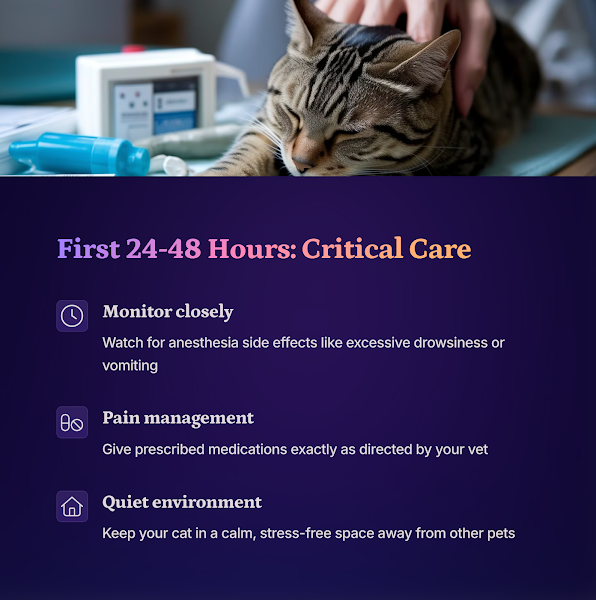Cat Neutering Aftercare: Everything You Should Know
🏠 Introduction to Cat Neutering Recovery
Neutering your cat is one of the most responsible decisions you can make as a pet owner. This common procedure helps control the pet population and offers numerous health benefits for your feline friend.
The recovery process, while generally straightforward, requires attentive care and monitoring to ensure your cat heals properly. Most cats bounce back quickly, but the first 24-48 hours are critical.
As a caring cat parent, understanding what to expect can help ease both your concerns and your pet's discomfort. This guide covers everything from immediate post-operative care to long-term considerations.
Remember that while this guide provides general information, your veterinarian's specific instructions should always take precedence. Every cat is unique, and their recovery needs may vary based on age, health status, and individual factors.
For more detailed information about the neutering procedure itself, you can visit the ASPCA's spay/neuter information page.
| Post-operative Care | Recovery Timeline |
| E-collar Necessity | Incision Monitoring |
| Pain Management | Activity Restriction |
| Litter Box Modifications | Veterinary Follow-up |
💊 Medications and Pain Management
Your veterinarian will likely prescribe pain medication to keep your cat comfortable during recovery. It's crucial to follow the dosing schedule exactly as prescribed, even if your cat seems to be feeling better.
✨ Most cats receive an injectable pain medication that lasts for 24 hours after surgery. You may be sent home with additional oral medications to continue pain management.
Never give your cat human pain relievers like acetaminophen or ibuprofen - these are extremely toxic to cats and can be fatal. Only use medications specifically prescribed by your veterinarian.
Some cats may also receive antibiotics to prevent infection, though this isn't always necessary for routine neuter procedures. If antibiotics are prescribed, it's essential to complete the entire course.
✨ Watch for signs of pain such as hiding, decreased appetite, or unusual vocalization. Contact your vet if your cat seems uncomfortable despite medication or if they refuse to take their medicine.
For tips on administering medication to cats, check out this helpful guide from International Cat Care.
Some cats benefit from natural calming aids like Feliway diffusers, which release synthetic feline pheromones that can help reduce stress during recovery. Learn more about feline pheromone products at Feliway's official website.
Remember that every cat responds differently to medication. Some may experience mild side effects like drowsiness or reduced appetite. These are usually temporary, but persistent side effects should be reported to your veterinarian.
If you're having trouble keeping track of medication schedules, consider using a pet medication tracker app or setting alarms on your phone to ensure doses aren't missed.
🛌 Creating a Recovery-Friendly Environment
✨ Set up a quiet recovery space for your cat, away from other pets and household hustle and bustle. A small room like a bathroom or laundry room often works well.
Ensure your cat has easy access to food, water, and a litter box without having to jump or climb. You might need to use a shallow pan as a temporary litter box to prevent strain on the surgical site.
For more information on creating an ideal recovery space, visit the Humane Society's guide to cat-friendly homes.
| Quiet Recovery Space | Temperature Control | Low-Stress Environment |
| Modified Litter Box | Cozy Bedding | Easy Access to Essentials |
| Minimal Jumping | Calm Atmosphere | Pet-Proofed Space |
| Proper Lighting | Familiar Smells | Monitoring Equipment |
🚨 Recognizing Complications
While complications are rare after neutering, it's important to know what signs might indicate a problem. Monitor the incision site daily for redness, swelling, discharge, or opening of the sutures.
Contact your veterinarian immediately if you notice any concerning symptoms. Early intervention can prevent minor issues from becoming serious complications. For emergency veterinary care resources, check the American Animal Hospital Association.
| How long should I restrict my cat's activity after neutering? |
| Most veterinarians recommend limiting activity for 7-10 days after surgery. This means no jumping, running, or playing that could strain the incision site. Use a carrier or small room to restrict movement when necessary. |
| When can my cat return to normal eating habits? |
| Most cats can resume normal eating within 24 hours after surgery. Offer small amounts of their regular food at first. If your cat doesn't eat within 48 hours after surgery, contact your veterinarian. |
| Is it normal for my cat to be lethargic after neutering? |
| Some lethargy is normal for the first 24-48 hours after surgery as the anesthesia wears off. However, prolonged lethargy beyond this period could indicate pain or complications and should be reported to your veterinarian. |









Comments
Post a Comment